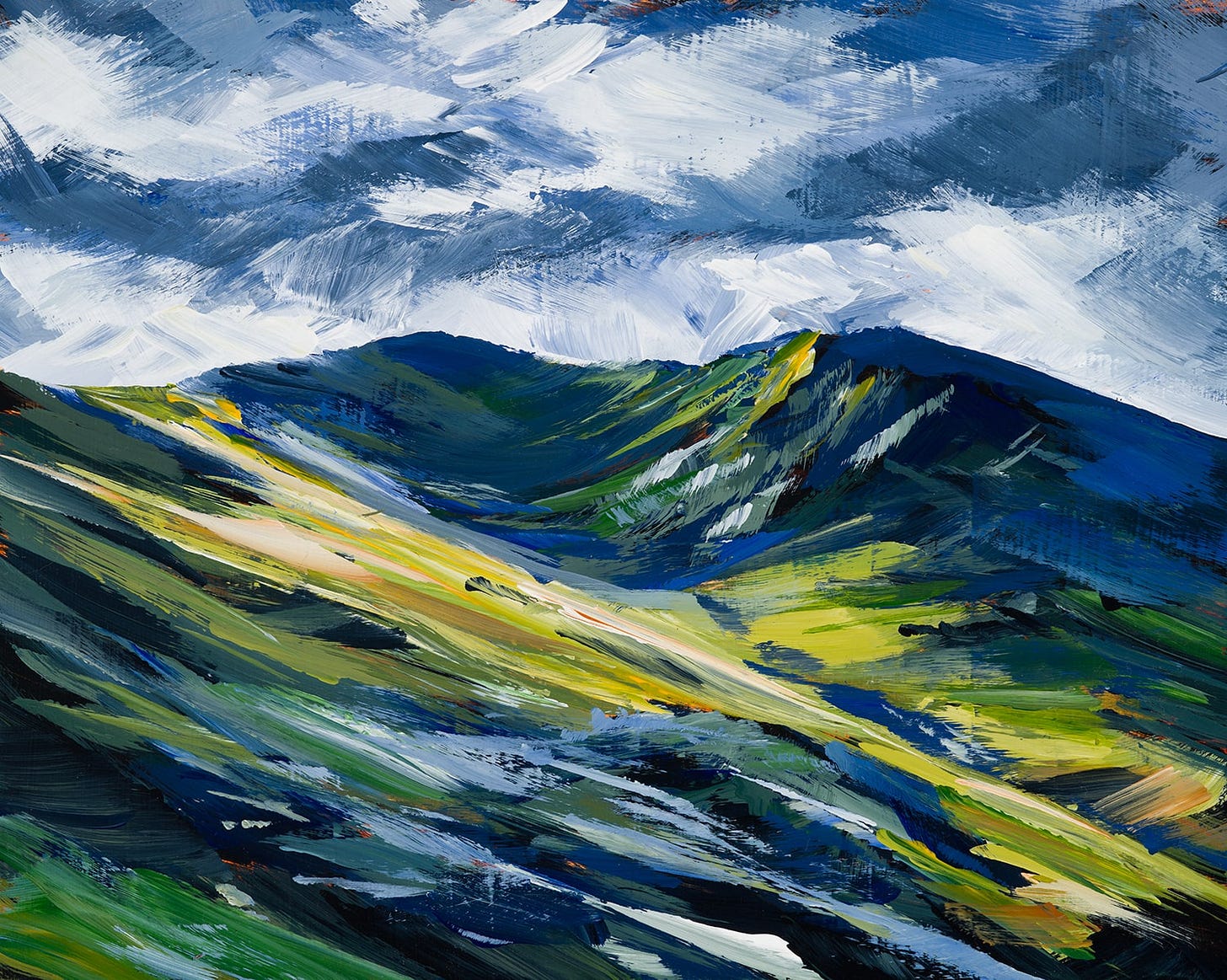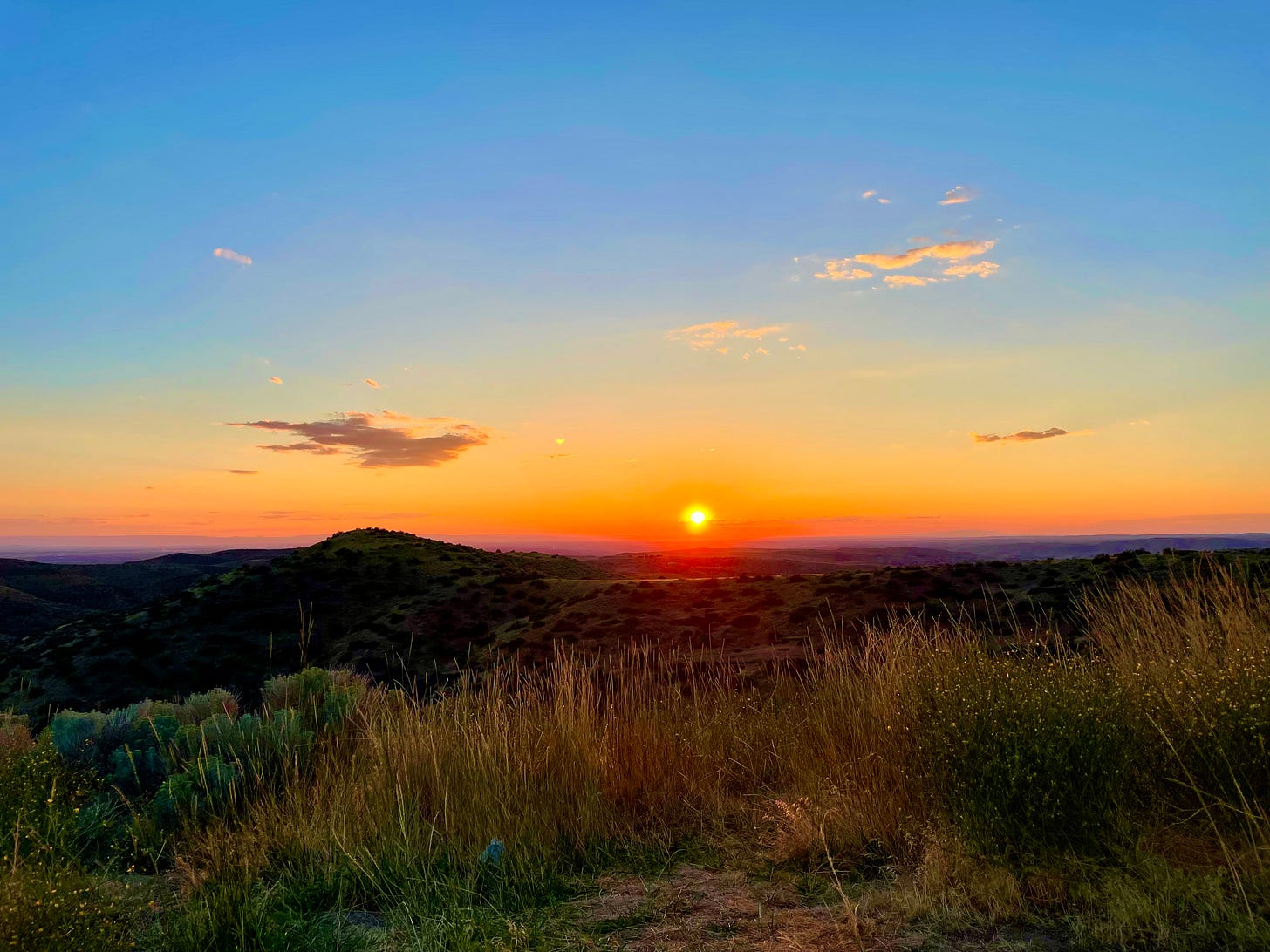Place Poem: "The World is Too Much With Us" by William Wordsworth
And some place picks for a week when we're all a little, or a lot, "out of tune"
Hey all—I’m beyond grateful for the support I’ve gotten for this newsletter so far, and am really eager for it to expand into new and exciting places. So if you’ve so far just been coming across this on Instagram, or Bluesky or wherever else, I’d really love it if you’d consider subscribing to get new posts directly in your inbox or through the Substack app by clicking below.
If you’re already a subscriber, it would mean the world to me if you’d consider forwarding or sharing this with someone who you think might enjoy it. Giving the post a “like” by hitting the heart up and to your left is also super helpful, even if you don’t have a Substack account. Thanks!
In talking through our complex, frustrated, and unresolvable feelings about the horrible situation in Gaza, my wife and I were trying to get to the bottom of why the conflict seems to be breaking so many people’s brains. Sympathy for those not like us is in shorter supply each day. The solving of the crisis by those who can do something feels more out of reach than ever. And the sheer powerlessness so many of us feel in the face of this is making many of us behave in really unhinged ways online.
The only explanation we could settle on is that from an evolutionary standpoint, we simply are not bodily equipped to understand, much less internalize, much less solve, such tragic situations happening so far away. It’s the artifice of technology—and notably not naturally-occurring interactions with other human beings near us—that’s making it possible for us to feel so much about something so terrible happening halfway around the world. Just a hundred years ago, we simply wouldn’t have known something like this was happening until many days after it started, if ever.
But today, when confronted immediately and viscerally with such a vastness of opinions, understandably righteous feelings, and truly incomprehensible takes about a centuries-old religious and cultural conflict, our brains and the whole of our senses have no other recourse than to either shut off entirely, or melt into a puddle and leak disgustingly all over everybody. Where else could they reasonably go?
As my wife was matter-of-factly laying out this explanation to me on our evening walk with the dog the other day, all I could think of was the title of today’s poem, and how true it feels right now.
The World is Too Much With Us
by William Wordsworth
The world is too much with us; late and soon, Getting and spending, we lay waste our powers;— Little we see in Nature that is ours; We have given our hearts away, a sordid boon! This Sea that bares her bosom to the moon; The winds that will be howling at all hours, And are up-gathered now like sleeping flowers; For this, for everything, we are out of tune; It moves us not. Great God! I’d rather be A Pagan suckled in a creed outworn; So might I, standing on this pleasant lea, Have glimpses that would make me less forlorn; Have sight of Proteus rising from the sea; Or hear old Triton blow his wreathèd horn.
I read and heard this poem for the first time in high school. As an 11th grader, it was pitched to us—and interpreted by me—as a bit of a scolding. Everything can feel that way when you’re seventeen. This bullet-pointed Honors English exam review I found in my email archives from June 14, 2006 gives us the low-down:
Sounds about right: We’ve lost touch with nature (“Little we see”); we’ve succumbed to consumerism (all that “Getting and spending”); we’ve lost touch with God (this was of particular importance, I’m sure, to the administrators of my Catholic high school). This poem is still, of course, all of these things, and all are lessons still worth learning.
If anything, Wordsworth’s sonnet1 rings as clearly today as when I first read it in 2006, and even as when it was first published in 1807. Upon reading it for the first time in awhile after getting home our evening walk, I found it applying effortlessly (as all timeless poems do) to the struggle I feel on a daily basis: just being alive as a person out there on the Internet.
In fact, I’m not sure I can think of something that describes the Internet better than Wordsworth’s “sordid boon” in line 4. The Internet—social media specifically—is a continuous windfall of knowledge, information, and opinions, a self-perpetuating chain reaction of miracles Wordsworth could never have fathomed.
And yet, in its awesome capacity, it has brought with it the hell of knowing far, far more than human brains were constructed to accommodate. And my sense, just from observing people’s online selves (including mine) over almost thirty years of being online, is that the Internet makes few of us kinder or more charitable versions of ourselves. Our beautiful, miraculous, deeply fallible homo sapien brains simply cannot keep up the ruthless speed of what we encounter when we swipe up on our magic rectangles every morning.
The Internet is an undeniable boon to human society and economy, and a (twisted) microcosm of it; but in being so, it is absolutely, irredeemably sordid. It promised us the world, and instead the crooked version of the world it gave us became “too much with us.”
What can we, or should we, do about this? We can’t, or shouldn’t, turn out backs on global suffering or descend into the kinds of consumerist distraction Wordsworth probably feared most acutely: “lay[ing] waste our powers” by squandering them on things that don’t matter and never will. We can all think of a dozen things we’ve attended to in the last week that fall into this category.
But neither, maybe, should we “give our hearts away” so completely to conflicts that we can’t ever hope to control or solve (the situation in Gaza) or to things that quite simply don’t matter (that random person in your feed’s shitty and unhinged opinion about Gaza). Maybe we need to reserve our heart, or parts of it, to the people and places and issues closest to us.

Wordsworth’s prescription was single-mindedly focused in on nature as he understood it in the early 1800s. The “howling” wind, the sea “bar[ing] her bosom to the sea,” are all very intimate, and visceral, and distinctly human-sounding despite their lack of humans. He gets even saucier than this towards the end of the poem. Religiously, our guy says he’d rather be a Pagan (heaven forbid!) who is at least able to recognize nature when it hits him in the face—via Proteus “rising from the sea” or Triton blowing “his wreathed horn”—than a One True God-fearing man who lets modernity go to his head.
Wordsworth is saying something super serious: he’d rather abandon his faith completely than risk getting sucked up into the rampant consumerism of the early 1800s. The main piece of technology Wordsworth was freaking out about was, I don’t know, the cotton gin or something. Personally, I’d love to see how quickly we could short-circuit this dude if we gave him an iPhone with a pre-loaded TikTok account.
Regardless, he’s got a point.
Place Picks
Now for some place picks, all of which have some wonderfully poetic tie-ins with our Wordsworth selection:
Music
“the lakes” by Taylor Swift (Apple Music / Spotify).
Honestly, I’m proud of myself for waiting four whole Place Pick posts before featuring a Taylor Swift song. Yes, I’m a bonafied Swiftie, and yes, it is thanks mainly to my lovely spouse. But a listen to this song, and a passing knowledge of the Lake District poets, will clue you in on why I chose it.
The Lake Poets, of which our friend Wordsworth was a quintessential member, were disparaged in their time as hopelessly romantic—which, as any Swiftie would know, is an enduring description of Taylor herself. The author of this particular poem (yes, she’s a poet, deal with it) makes her own wily reference to The Lakes and poets that haunted their shores in the early 19th century:
What should be over burrowed under my skin
In heart-stopping waves of hurt
I've come too far to watch some namedropping sleaze
Tell me what are my words worth
We see what you did there, Taylor!
The song is characteristically overwrought, with Swift wailing with self-awareness about her “calamitous love and insurmountable grief,” but the beauty is that it’s all on purpose. She’s shamelessly, wonderously placing her words (which are worth a whole lot, it turns out) among the romantics of the period, all while insisting she doesn’t belong there unless she’s with her (at the time that she wrote this song) decidedly English “muse.” What’s more romantic than that?
Podcasts
“#46 Dan” by Heavyweight.
Jonathan Goldstein’s podcast Wiretap was, back in the day, one of the only podcasts I refused to miss. In addition to being a master storyteller, Goldstein is unspeakably hilarious in his dry approach to what he calls “Serious. Journalism.” He has one of those voices that I now cannot separate from riding the DC Metro in 2014 and 2015, markable now as the beginning of the new podcast renaissance.
Goldstein has since moved his podcasting to Gimlet Media (now housed under Spotify) under the title Heavyweight, which is very much not a podcast about boxing. In each episode, Goldstein helps people try to resolve a moment from their past that they wish they could change.
In this case, Jonathan comes to the aid of Dan, who is deadset on getting into his possession a photograph of him and his now-wife (This American Life producer Nancy Updike) that was taken on their first date back in 2003. The identity of the photographer seems, at first, lost to history. The date took place at a restaurant in Israel where they don’t keep receipts. And Dan’s relationship with his father plays a central (and gut-wrenching) role in this quest.
Everybody has different levels of emotional resonance with stuff like this, so I won’t outright promise that you’ll cry. But I do know that Goldstein is a grandmaster of the podcasting craft (whatever that is), and that this 38 minutes is about the best thing I can think of for you to “give your heart away” to this weekend if you can spare it.
Art
I’m guessing everyone’s had enough to read (including this interminable post) this week, so I figured I’d give you something to look at instead.

We return to the Wordsworth (and Swift) stomping grounds for this absolute beauty of a painting, which depicts Helvellyn, a mountain in Lake District National Park in the UK. I am not an art critic, and so I won’t go on at length about this work, except to say that I think it’s absolutely rad and does an incredible job capturing the criss-crossing of emotions I feel when confronted with a monumental natural achievement of this size and impressiveness.
Matt is not the only artist featured on the Lake District Art collective, which you can see more of on their Instagram, which I am confident is just a boon, and not the sordid kind.
In this case, a Petrarchan sonnet—meaning, it follows a rhyme scheme of ABBA/ABBA/CDCDCD.





Sordid boon is an excellent phrase
You are not alone in having read this poem in high school!